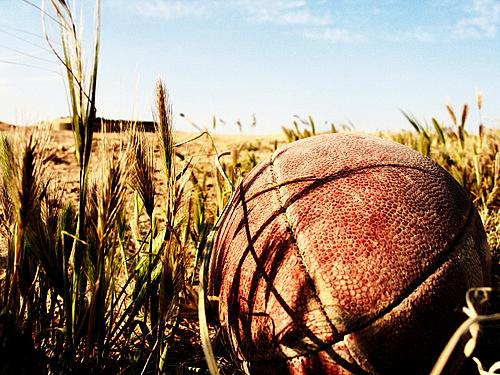Herd Immunity: Fighting infections one football team at a time

As is often the case this time of year, there was a bloodbath in the locker rooms of professional football teams all over the National Football League this week.
Five coaches were fired. Among them was Greg Schiano, coach for the Tampa Bay Buccaneers.
The Bucs were infamous for two things this season. One was their losing record (4 wins, 12 losses). And one was a series of infections from methicillin-resistant Staphylococcus aureus (MRSA).
MRSA was usually mentioned as a distraction, not a prime driver of the losses.
Pat Yasinskas at ESPN wrote:
A long and painful season is over. The Bucs had to endure the [quarterback] Josh Freeman saga, an outbreak of MRSA and an 0-8 start. They never really recovered from any of that.
Ben Volin at the Boston Globe wrote:
Their season got off to a bad start in training camp when two players were found to have contracted MRSA infections — Pro Bowl guard Carl Nicks had a blister on his foot that became infected, and kicker Lawrence Tynes had an in-grown toenail that did the same. The problem has lingered all season in Tampa, with a third player, cornerback Johnthan Banks, also developing a MRSA infection ...
Dr. Deverick Anderson at Duke Health has been outspoken about MRSA outbreaks among sports teams, and he made an excellent point to Volin:
I think that because of the negative PR backlash, you probably have a lot of people doing their best not to report it. … It’s probably more common in the NFL than even most people would think.
So let’s correct that. If we want to get a handle on both health care-associated infections and community-acquired infections, we need to know more about where they originate and what works to fight them. If Peyton Manning – who suffered a serious infection in 2008 – can sell pizza, why couldn’t he and other players become visible examples of the importance of fighting infections? To that end, here is the recent history of staph infections in the NFL.
2003 – Five players for the St. Louis Rams developed MRSA infections, all growing from injuries on the field. Ben Taylor from the Cleveland Browns was diagnosed with MRSA, the first of five players from the Browns to develop the infection over several years. Junior Seau and Charles Rodgers of the Miami Dolphins and Kenyatta Walker of the Tampa Bay Buccaneers were hospitalized with MRSA infections.
2004 – The Washington Redskins suffered the first of five cases of MRSA that developed over the next two years. Star defensive tackle Brandon Noble had to quit playing following his MRSA infection, which started after a minimally invasive knee surgery.
2005 – A survey conducted by Dr. Andrew Tucker, president of the NFL Physicians Society, showed that 60 NFL players had contracted MRSA.
2006 – Cleveland Browns center LeCharles Bentley’s tendon was torn during training camp, and he contracted a MRSA infection that required multiple surgeries and nearly killed him. He later sued the team and settled out of court.
2008 – After a knee surgery, Indianapolis Colts quarterback Peyton Manning had a second surgery to deal with a staph infection. The team said the infection was not MRSA. Manning missed most of training camp. It was the first season since 2002 that the Colts did not win the AFC South title. Kellen Winslow, a Cleveland Browns wide receiver, was hospitalized with a staph infection and accused the team of trying to cover up his infection. The Browns suspended him for one week. Future hall of fame quarterback Tom Brady of the New England Patriots had to undergo at least two procedures to treat a suspected staph infection following a knee surgery.
2009 - Former receiver Joe Jurevicius sued the Cleveland Browns, saying that the team did not keep its facilities clean enough, leading to a MRSA infection that sidelined him. He later settled with the team. A survey conducted by NFL physicians showed that there had been 33 cases of MRSA in the league from 2006 to 2008.
2013 – Three players for the Tampa Bay Buccaneers were diagnosed with MRSA: rookie cornerback Johnthan Banks, kicker Lawrence Tynes and guard Carl Nicks.
Which player will step up to do for staph infections what players have been able to do for car insurance, headphones, and soup?
Image by Jayel Aheram via Flickr

